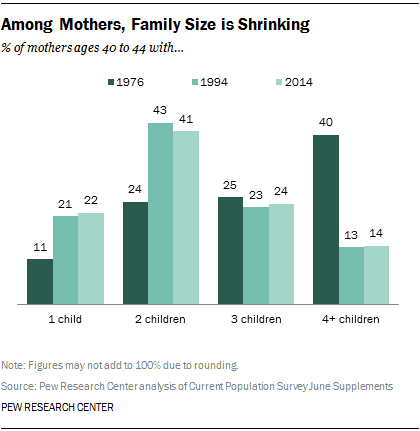Wow! Only the second time in eight years that this one has visited the Polish Plantation. Was able to take a better picture this time. It’s a red-whiskered bulbul, though his red whiskers are only visible from specific angles in some light. They’re native to Southeast Asia, but a few are living wild and free in Los Angeles.
First-borns are taking over — Should we be afraid?

Over at The Cut, Adam Sternbergh bemoans the slow-motion extinction of the middle child. As fewer families have more than two children, the number of middle-born children declines. Dramatically.
I’m interested in a related phenomenon — the fact that first-borns are a much greater percentage of the population now than in previous decades. Using the chart above from the Pew Research Center, I estimate that first-borns have gone from about one-third of the population born from 1950-1975 to over 50% of the population born from 1990-2014.
Effects of birth-order on personality seem to be largely overblown. But what if there is some small tendency of first-borns to be more conforming, more socially dominant, less open to new ideas. Could those small effects — multiplied across our whole society — be contributing to the change in how we talk to each other about politics?
It’s pure speculation, of course. But it makes this first-born wonder.
HT Althouse.
Share this post
LA Freeway by Guy Clark – one of my favorite songs about Los Angeles

Share this post
Was Alan Watts the Jordan Peterson of the 50’s and 60’s?

Reading this story about Packers’ running back Ty Montgomery led me down a rabbit hole that led to this fascinating character Alan Watts, a public intellectual in the 50’s, 60’s and 70’s who brought Eastern philosophy and religion to a popular Western audience.
It started with the Parable of the Chinese Farmer, which was recommended to Montgomery by one of the guys on the practice squad. (Montgomery is coming back from an injury-shortened season in 2017.) Listen to Watts’ telling of the parable below. Good stuff.
At the risk of committing heresy against unknown true believers, it seems that Jordan Peterson is working within the Alan Watts tradition. Watts called himself a “philosophical entertainer” and reached an audience primarily through audio. Even today, there are hundreds of Watts lectures on YouTube, often paired with psychedelic animations.
Peterson and Watts both think of suffering as inherent to human experience.
And they both admire Jung!
Share this post
First page – Eternal Sunshine of the Spotless Mind

Here’s the first page of Eternal Sunshine of the Spotless Mind. The brilliant Charlie Kaufman breaks at least two rules here: (1) starts with a block of action description that is 16 lines long (any more than four and everyone will know you’re an amateur!), (2) tells us what is printed on his tie (not the writer’s business!), and (3) introduces a voiceover to tell us what is happening (verboten!).
What I love most about this is the quick start. We meet Joel right away. We know that something is amiss. We know it’s Valentine’s Day. But we want to know even more. He’s lying to his co-worker, right? Why is this seemingly reclusive man going to the beach? You could argue that the rest of the movie sets out to answer that question for the audience.
This is the first in a series of posts where I’ll post the first page from the screenplay of a movie I love. And we’ll see what we can learn.
Share this post
We’re all Keynesians now — except when we’re not

The famous quote is “We’re all Keynesians now” credited to Milton Friedman and/or Richard Nixon. Or as Paul Krugman wrote in 2011, “Keynes was right“.
What they mean is that — in an economic downturn — there’s a general consensus among economists, policy makers, and monetary leaders that the government should engage in expansionary policies, increasing the federal deficit and enlarging the money supply. As Keynes said: “The boom, not the slump, is the right time for austerity.”
As someone who was once an unrepentant deficit hawk in the style of the Concord Coalition, I have to admit that these types of policies have established a track record of easing economic pain in the short run. It’ s made me reconsider some of my most dearly-held beliefs.*
But it also begs the question: Where are the calls for austerity now? This is the boom that Keynes was talking about. To be consistent, Krugman and all of the Keynesians (i.e., everyone!) should be arguing loudly for decreasing the deficit and tightening the money supply. But that’s not happening.
It’s easy to be a Keynesian during a downturn. Just open up the spicket to placate a panicked populace. It’s a lot harder to do as Keynes recommended and actually tighten things up when the party is underway.
*As an aside, there is no doubt in my mind that the expansionary policies of Bernanke and Obama helped ease the pain, and perhaps prevented a much more significant downturn, during the Economic Crisis. That said, I still feel very ambivalently about those policies. The crisis was caused — at least in part — by incredibly loose monetary policy and incredibly large budget deficits under George W. Bush. Seemingly, we were able to avoid a Depression by (1) making monetary policy even looser, (2) increasing federal spending at a time when the deficit was already historically high, and (3) transferring billions of dollars of debt from private entities to public ones. That’s a troubling pattern… We may have only been successful in kicking the can down the road.
Share this post
Impressive failure — the key to screenwriting and parental bonding?

One of my screenwriting teachers turned me onto this idea of impressive failure as an important tool in getting your audience to bond with the protagonist of your film. Think of Luke Skywalker and all the ways he fails in the first hour of Star Wars…
- Tries and fails to convince his uncle to let him join the Rebellion
- Tries and fails to rescue the droids from the Sand People
- Tries and fails to learn how to use the Force with his lightsaber
- Tries and fails to rescue Princess Leia (leads her into trash compactor)
- Tries and fails to save Obi Wan
When we watch a character try so hard and fail, over and over, we are increasingly bonded to that character. We desperately want them to succeed. This often works even when the character is trying to achieve some goal that we would normally find reprehensible. And thus we often find ourselves rooting for gangsters and bank robbers.
It recently occurred to me that the same kind of thing goes on in parenting. You spend so much time watching your child try and fail to do the most basic tasks. Rolling over, grabbing a pacifier, sitting up, crawling, walking. There are hours and hours of attempts before it actually works. And with every failed attempt, you feel more and more bonded to this little human.
Share this post
Double meaning – The “broken windows theory” vs. the “broken windows fallacy”

Two influential ideas from the social sciences. A theory and a fallacy. With the same name.
The broken windows theory was first introduced by James Q. Wilson and George Kelling in 1982. The idea is that small signs of disorder in a community — like broken windows — can increase the sense of lawlessness and lead to more serious crimes. Police leaders in the 1990’s and 2000’s used this theory to justify a crackdown on lots of small offenses (drunkenness, fair evasion, vandalism), believing that it would lead to a reduction in violent crime. (Violent crime has indeed decreased dramatically since the rise of these policing techniques, though no one is quite sure if the relationship is causal or not.)
The broken windows fallacy is 130 years older. Frédéric Bastiat introduced this thought experiment in 1850 in order to show that GDP is not a full measure of an economy’s health. In fact, certain things that might increase GDP — like the repair of a broken window by a glazier — might reflect an underlying loss of economic wealth. This is why we don’t root for natural disasters…. They might lead to an increase in GDP as we aim to replace destroyed capital. But that increase in GDP doesn’t reflect wealth creation.
Back in 2012, Matthew Yglesias fell into a 21st-century version of the broken windows fallacy, when he wrote this article for Slate:
Yes, perhaps divorce does lead to an upward blip in GDP. But it’s almost certainly also destroying economic wealth, and there’s no doubt that it reflects a reduction in the well-being (the utility, if you will) of the folks involved.
Some enterprising young professor needs to craft a whole course on behavior and economics, using broken windows as a case study.
–
Photo by Tomas Castelazo – Own work, CC BY-SA 3.0, Link
Share this post
Sesame Street teaches that correlation isn’t causation

Just realized what the punchline of this skit is about.
Share this post
The “unhinged delirium” of preacher/musician Claude Ely

We visited a new church in Highland Park yesterday, and the band played “Ain’t No Grave” by Claude Ely, which is just amazing. It’s basically proto-rock-and-roll …written in 1934.
Claude Ely was a preacher, songwriter, singer. Legend has it that Elvis’s mom took him to Ely’s tent revivals, and it’s not hard to hear Elvis in this recording. The Washington Post said that Ely had an “unhinged delirium.”
What a find.

